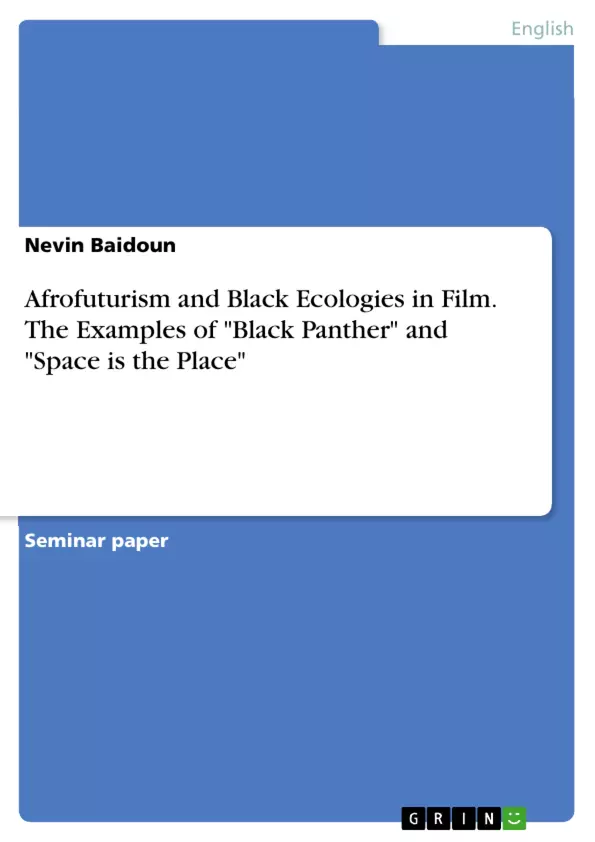This paper deals with Afrofuturism and black ecologies in american films. A survey from October 2017 has shown that almost all of the black people who responded to it (92 percent) said they felt that discrimination against African-Americans exists in America today. Furthermore, at least half said they had personally experienced racial discrimination concerning equal pay, employment, and promotions, or in their encounters with police, but also when going to a doctor or a health clinic.
Many of these surveys illustrate the discrimination today of especially African Americans in the United States and hence their dissatisfaction with the political situation in the country concerning the treatment of colored people. Despite the civil rights movement during the 1950s and 1960s, which was a struggle for social justice for blacks to gain equal rights under the law in the United States, discrimination against blacks did not end then (History). Even though the Civil War (1861-1865) officially abolished slavery, African Americans continued to endure the devastating effects of racism, especially in the South (History).
Table of Contents
- 1 Introduction
- 2 Theoretical Background
- 2.1 What is Afrofuturism?
- 2.2 Afrofuturism in Film
- 3 Afrofuturism in Film in the 20th and 21st Century
- 3.1 Analysis of Space is the place (1974)
- 3.2 Analysis of Black Panther (2018)
Objectives and Key Themes
This text explores the concept of Afrofuturism, specifically within the context of film. The author analyzes key examples like "Space is the Place" and "Black Panther" to understand how this artistic movement engages with issues of racial discrimination, historical injustices, and the potential for a future shaped by Black perspectives. The text aims to provide a comprehensive understanding of Afrofuturism's history, development, and significance in contemporary culture.
- The origins and evolution of Afrofuturism.
- Afrofuturism's role in addressing contemporary issues related to race and identity.
- The portrayal of Black perspectives and narratives in science fiction and fantasy films.
- The intersection of Afrofuturism with themes of technology, culture, and politics.
- The influence of Afrofuturism on contemporary film and its potential for social change.
Chapter Summaries
The introduction highlights the ongoing reality of racial discrimination against African Americans in the United States and situates Afrofuturism as a form of artistic and cultural resistance. It introduces the films "Space is the Place" and "Black Panther" as key examples of Afrofuturism in cinema.
The theoretical background chapter delves into the definition and core elements of Afrofuturism. It emphasizes the movement's connection to Black history and culture, its exploration of alternative futures, and its unique fusion of science fiction, fantasy, and social commentary. The chapter discusses the origins of the term and explores its potential for challenging dominant narratives about race and identity.
Keywords
Key terms and concepts explored in this text include Afrofuturism, Black identity, racial discrimination, science fiction, fantasy, film analysis, "Space is the Place," "Black Panther," Afrocentrism, cultural resistance, social change, and the Black experience.
Frequently Asked Questions
What is Afrofuturism?
Afrofuturism is an artistic and cultural movement that combines elements of science fiction, fantasy, and Afrocentrism to explore the Black experience and imagine alternative futures.
How does "Black Panther" represent Afrofuturism?
The film showcases Wakanda, a technologically advanced African nation that was never colonized, blending traditional culture with futuristic technology.
What is the significance of the film "Space is the Place"?
Featuring jazz musician Sun Ra, the film is a seminal work of Afrofuturism that uses space travel as a metaphor for liberation from racial discrimination on Earth.
How does Afrofuturism address racial discrimination?
It acts as a form of cultural resistance, allowing Black creators to reclaim their history and envision a world where Black perspectives shape the future.
What are "Black Ecologies" in film?
This refers to the intersection of environmental issues and the Black experience, often highlighting how racialized groups are affected by their physical and social environments.
- Quote paper
- Nevin Baidoun (Author), 2018, Afrofuturism and Black Ecologies in Film. The Examples of "Black Panther" and "Space is the Place", Munich, GRIN Verlag, https://www.grin.com/document/1042143



